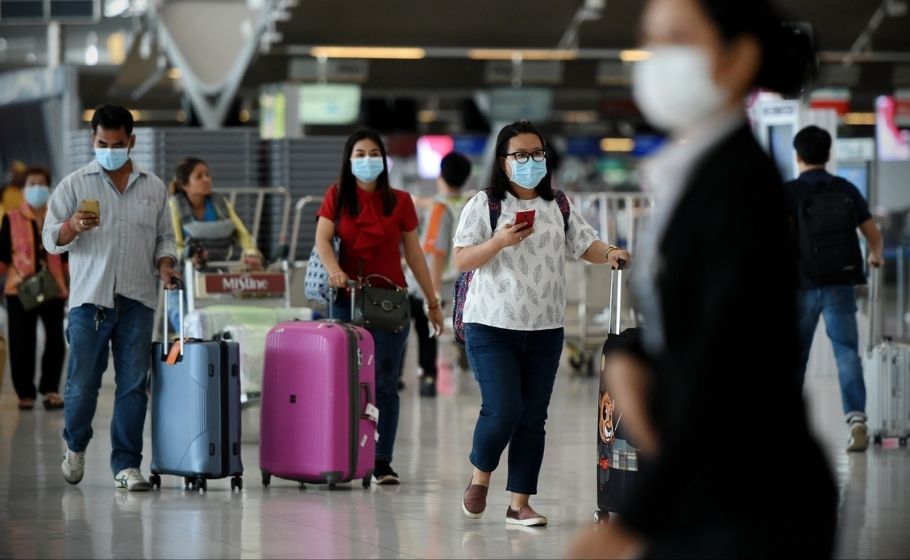
Passengers without mask to be 'de-boarded' from flights, DGCA rules
In the wake of rising coronavirus cases across the country, the Directorate General of Civil Aviation (DGCA) on Saturday (March 13) announced that passengers will be "de-boarded" if they fail to follow "COVID-19 protocols”, which primarily includes wearing a proper mask.

In the wake of rising coronavirus cases across the country, the Directorate General of Civil Aviation (DGCA) on Saturday (March 13) announced that air passengers will be “de-boarded” if they fail to follow “COVID-19 protocols”, which primarily includes wearing a proper mask.
In case of repeated violation of the protocols, the passenger will be treated as ‘unruly passenger’, read a DGCA circular.
DGCA guidelines for air travellers
1) Passengers shall wear masks and maintain social distancing norms at all times during air travel. The mask shall not be moved below the nose except under exceptional circumstances.
2) CISF or other police personnel deployed at the entrance of the Airport shall ensure that no one is allowed to enter the Airport without wearing a mask. CASO and other supervising officers must ensure this personally.
3) The Airport Director/Terminal Manager, as applicable, must ensure that passengers are wearing masks properly and do maintain social distance at all times within the Airport premises. In case, any passenger is not following “COVID-19 Protocol”, they should be handed over to security agencies after proper warnings. If required, they may be dealt as per law.
4) On board the Aircraft, in case any passenger does not adhere to wearing of mask properly even after repeated warnings, he/she should be de-boarded, if need be, before departure. In case, any passenger on board an aircraft refuses to wear mask or violates the “COVID-19 Protocol for passengers” even after repeated warnings, during the course of the flight, such passenger may be treated as “Unruly Passenger” as defined in para 3.1 of Civil Aviation Requirements (CAR) Section 3 Series M Part VI (dated 8th September, 2017) and the procedure in respect of handling such unruly passenger, as provided in above mentioned CAR, shall be followed by the concerned Airline.
Also read: In-flight photography permitted, no devices causing ‘chaos’ allowed: DGCA
Surge in COVID cases
Meanwhile, 24,882 new infections were reported in the country in the last 24 hours, which is the worst since December 19 last year. The caseload has gone beyond 1.1 crore, which puts the country in the third position, after United States and Brazil.
India’s COVID death toll rose by 140 to 158,446, in comparison to a daily average of about 100 since early February.
In Madhya Pradesh, Chief Minister Shivraj Singh Chouhan said night curfew will be imposed in Bhopal and Indore from Sunday or Monday. People coming from Maharashtra will have to undergo thermal scanning.
Maharashtra has, so far, reported more than 22 lakh confirmed infections, which is roughly 1/4th of all cases in India. On certain days, the contribution went past 40%.
On Thursday (March 11), Maharashtra contributed in excess of 60% cases for the first time. A total of 23,285 positive COVID cases were reported in the country that day, of which 14,317 came from Maharashtra. On Friday, the state reported nearly 16,000 new cases.
Also read: India’s COVID task force studying Covishield amid side-effects concerns
Cases on the rise, but severity low
The second wave of COVID may have worried the health machinery, but it is reassuring to know that the severity of the disease this time is far less than what it was last year. A declining death rate is evident of the trend.
India’s overall case fatality ratio (CFR), or the number of deaths as a proportion of confirmed infections, is around 1.4 percent. That means about 14 people out of every 1,000 confirmed infections have died so far. However, for who infected since January 1 this year, this ratio is only about 0.87 percent.
Record vaccination on Friday
More than 20 lakh vaccine doses were administered across the country on Friday (March 13), the highest single-day count so far.
As many as 16,39,663 beneficiaries – healthcare workers and frontline workers were vaccinated for the first dose and 4,13,874 such people received the second shot, news agency PTI reported.

